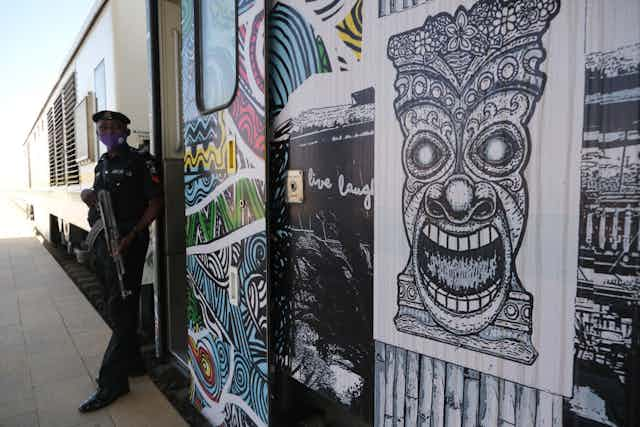Crime is among the major challenges confronting Nigeria as a nation. The pervasiveness of crime has repeatedly called into question the effectiveness and efficiency of the Nigeria Police Force. This is despite their exclusive reliance on modern policing strategies and techniques.
Traditionally, crime-related matters have been handled through what’s known as “spiritual security”. This is a knowledge system that involves the use of amulets, charms, rituals and talismans for protection, power and clairvoyance.
As sociologists specialising in criminology, we were interested in what the Nigerian police personnel had to say about these mechanisms of protection.
We conducted a study of their perceptions and attitudes. Many told us that they believed criminals used spiritual security for power and protection. Some officers confirmed that they themselves used charms and the like to help in their jobs.
Nigerians use spiritual security mechanisms in other areas of social life such as healthcare delivery, conflict resolution and household crime control. But they’ve been overlooked in formal policing.
We conclude that this indigenous approach to crime fighting could prove useful to the police, particularly in intelligence gathering, crime investigation and crime control. Traditional belief systems could complement the country’s colonially based law enforcement and social control systems and improve their efficiency.
Traditional belief systems
Spiritual security is a traditional knowledge system that dates from precolonial times. It was a way that Nigerian people dealt with social issues. Not only for security, but also to settle disputes and for social control, conflict resolution, justice administration, peace engineering and social harmony.
The knowledge system of most African societies is generally predicated on a belief system that’s divided into the physical (visible and seen) and the spiritual (mysterious and unobservable). History tells us that African people gave high credence to this system of knowledge.
Although mystical, preternatural and esoteric powers are virtually inexplicable, many Nigerians believe that they know when they are being manipulated by those who have access to such powers.
The study
Our research was carried out among police officials serving at the Oyo State Police Command. We interviewed 35 police officers belonging to the State Criminal Investigation and Intelligence Department and the Special Anti-Robbery Squad.
We wanted to know to what extent the police were aware of criminals using spiritual security mechanisms. And we asked for their views on the police using them too. Should they be integrated into police operations?
Most police officers acknowledged that the system of spiritual security mechanisms was part of a cultural heritage which many Africans employed. They explained that people did so to protect themselves from their enemies’ spiritual attacks and to neutralise the impact of deadly weapons such as guns, machetes and knives.
Participants said that their professional experiences in the field showed that criminals routinely used spiritual security mechanisms. They did so to strengthen and protect themselves when perpetrating crime such as armed robbery, kidnapping, rape and homicide.
There was no clear consensus about whether the mechanisms were effective or not. But many officers said they believed that the criminals’ use of spiritual security was capable of compromising police operations. One police officer said:
Criminals, especially armed robbers, usually rely on it. Some time around 2003 … we arrested four armed robbers and handcuffed them. Can you believe that two of them who were handcuffed together disappeared? … What happened that day was like a miracle. It was only after making consultation from the people who are knowledgeable that we were told that one of them deployed egbe (a spiritual device for disappearance).
Our research also established that some police officers were secretly consulting custodians of the traditional knowledge system to enhance their performance and safety on the job.
Our respondents, however, expressed differing opinions about whether spiritual security mechanisms should be integrated into modern police work. Those who supported the idea believed it could improve crime fighting and help keep officers safe.
Others dismissed the idea. They stressed the value of modern policing strategies and technology. Some said their religion (both Christian and Muslim) expressly forbade them from associating with traditional charms. Some felt it went against police culture and codes.
Physical security and spiritual security
The work experiences of police officers, however, generally demonstrated the importance of a knowledge system that recognises a connection between physical security and spiritual security.
Modern policing strategies are not adequately dealing with Nigeria’s crime and insecurity crisis. Notorious criminals are combining the use of sophisticated weapons with spiritual charms.
We recommend that Nigeria’s police force should explore any potential advantages that the system of spiritual security mechanisms might offer. If well applied, this hybridisation could boost intelligence gathering capacity and crime control efforts.

